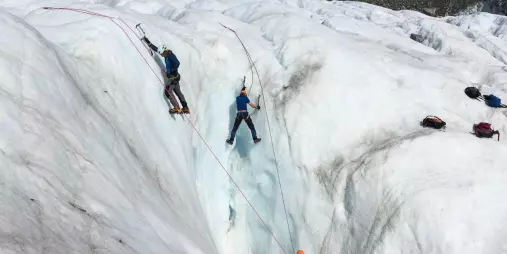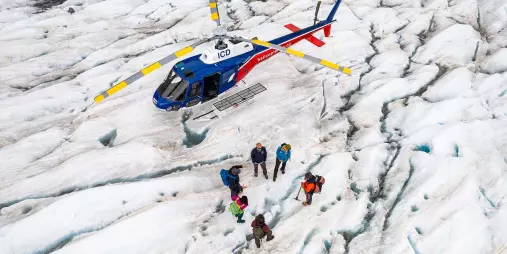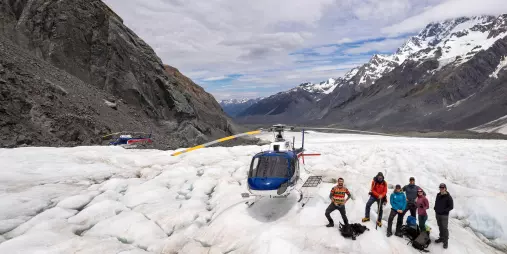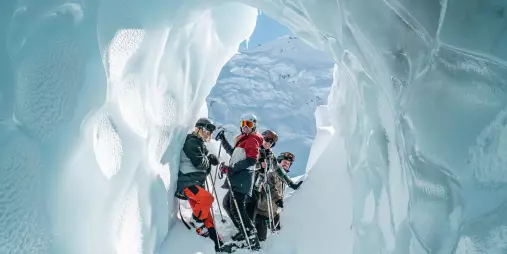A Rewarding Adventure for Every Explorer
Mount Sebastopol’s varied terrain makes it an ideal day hike for those wanting a taste of alpine adventure without needing extensive mountaineering experience. The combination of steady climbing, light scrambling, and jaw-dropping scenery keeps every moment engaging. From the summit, the view stretches endlessly across glaciers, valleys, and the towering peaks of the Southern Alps.
Whether you’re a seasoned hiker or a first-time visitor to Aoraki/Mount Cook National Park, this hike offers a remarkable way to connect with New Zealand’s natural splendour. The crisp alpine air, the golden tussock slopes, and the ever-changing light create a landscape that’s both peaceful and awe-inspiring. It’s a true Southern Alps gem, promising memories that stay long after the descent.
INCLUSIONS
- Private professional mountain guide
- Picnic lunch
- Use of technical equipment, including hiking boots, rain jackets, pants, gaiters, backpacks, and hiking poles.
AGE INFORMATION
- Children need to be at least 12 years old and confident on uneven terrain. We reserve the right to change these requirements due to terrain and weather conditions.
- If under 18 years, must be accompanied by a parent/guardian. Maximum of 2 minors per guardian.
CANCELLATIONS & REFUNDS
- More than 8 days before departure: Full refund*
- 7 days to 24 hours before departure: 25% cancellation fee*
- Within 24 hours before departure: No refund
- No shows are charged in full.
Note: *Refunds exclude credit card or booking fees if applicable, which are non-refundable.
Please see more information on refunds and cancellations in Go New Zealand's terms and conditions.
- Experience Required – Previous trekking or hiking experience is essential. Routes go beyond marked trails, including uphill, downhill, stepped, and natural surfaces.
- Fitness Level – Good aerobic fitness is required. Participants must be able to walk for at least five hours over uneven terrain while carrying a small backpack (4 to 5 kg).
- Health & Medical Conditions – Pre-existing medical conditions, including medications, must be disclosed when booking, as they may affect participation.
- Safety & Participation – Poor fitness or medical conditions may impact your ability to complete the trip. Guides may shorten or cancel activities if a participant’s ability is unsuitable.
- Refund Policy – No refunds will be given if you are unable to complete the experience.
- Sunglasses, sunscreen, and lip balm – SPF 50 recommended.
- Water bottles or hydration bladders – Minimum 1.5L.
- Hiking clothing – Choose lightweight, quick-drying fabrics designed for outdoor activities. Avoid cotton.
- Warm layers – Mountain weather can be unpredictable, even in summer.
- Warm hat and gloves – Essential for changing conditions.
- Sun protection – Baseball cap or legionnaire hat, scarf/neck gaiter, and a light-coloured, quick-drying top.
- Camera – Don’t miss the chance to capture stunning landscapes!
Gear Available to Use:
- Hiking boots, rain jackets, pants, gaiters, backpacks, and hiking poles.
Mountain Hiking is an adventure activity. Under New Zealand legislation we must advise you of the potential hazards involved before you make a booking.
Our guides will identify, assess, eliminate, or minimise risks involved, so far as reasonably practicable, and you (the client) will follow the guide’s instructions at all times and understand that this is critical to your safety and that of the group.
If you have any concerns or require further information, do not hesitate to contact us. Safety is paramount, and we are committed to addressing any queries you may have.
Mountain Hiking Risks
- Changing Weather Conditions: Mountain weather can change rapidly and significantly. Severe storms, high winds, heavy snowfall, and freezing temperatures are common. Although we will not go given a poor weather forecast, you must be prepared for sudden weather changes that may impact visibility and navigation, leading to increased dangers on the mountain.
- Terrain Hazards: The terrain in alpine environments includes, but without being exhaustive, things such as falling rocks, cliffs, cornices, changing snow conditions, steep slopes, loose rocks, and wet and icy surfaces. It is crucial to exercise caution, use proper equipment, and maintain focus to avoid potential falls, slips, or tripping hazards that may lead to serious or fatal injuries.
- Avalanche Risk: Our guides continually assess avalanche risk. The potential of an avalanche affecting the terrain we hike in is unlikely, but there is still an inherent danger. Avalanches can cause severe injuries, burials and fatalities.
- Physical and Mental Fitness: Mountain hiking demands a moderate to high level of physical fitness. Depending on the trip you are booking, you should be prepared to endure several hours of uphill climbing, tiredness, and potentially situations that may push you outside of your comfort zone. It is essential to be honest about your fitness levels to ensure you are adequately prepared for the rigours of the activity.
- Equipment Failure: The use of specialised mountaineering equipment and gear is crucial for your safety. However, it is important to recognize that equipment can fail or be misused. Clients must always follow the instructions provided by our guides, wear appropriate gear, and ensure they are comfortable with the handling and usage of equipment.
- Natural Disasters: The Southern Alps sits on the Alpine Fault. Natural disasters such as earthquakes can occur without warning.






